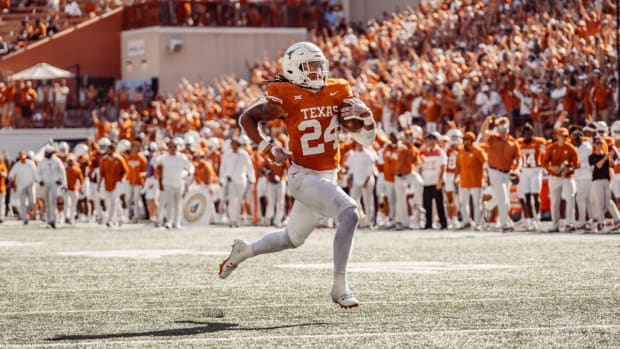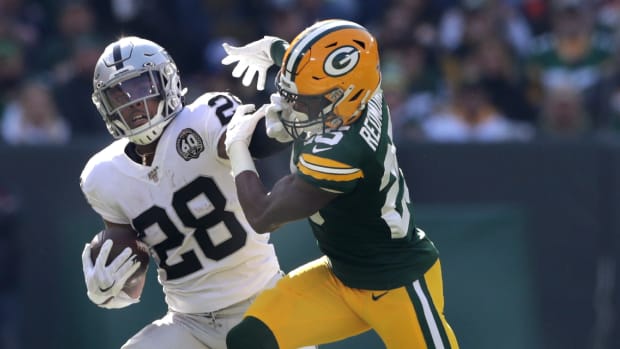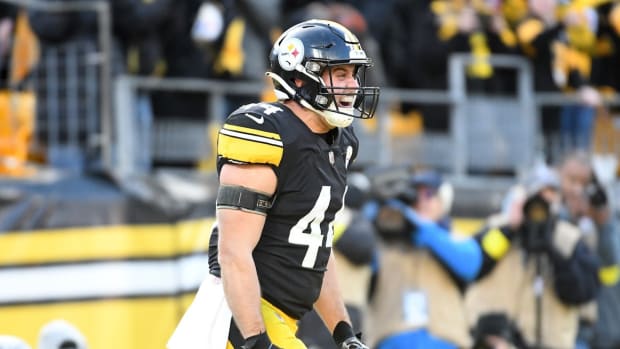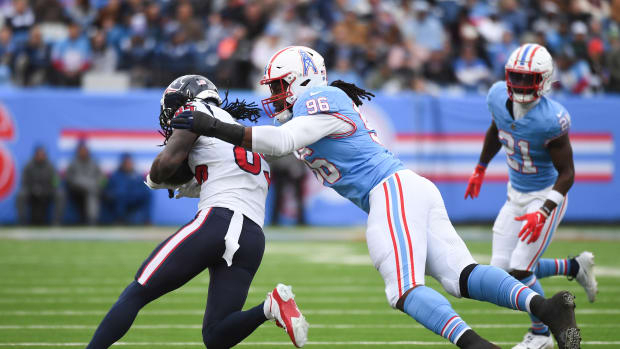Showing Their Stripes Too Much
Tom Brady was not happy with the ruling on the final play in the Patriots' loss Monday night. He was not alone. (Jeremy Brevard/USA Today Sports)
It’s a very popular sentiment these days for people to come out and declare they won’t let their kids play football any more because the game’s too dangerous. But the way I see it, that doesn’t go nearly far enough. I wouldn’t let my kids referee the game either. At least not at the NFL level.
Who needs that kind of headache?
As everyone knows by now, Week 11 was a very bruising week for the guys who wear the zebra stripes in the NFL, filled with pressure, scrutiny, ridicule and some lasting damage. Between the controversial game-changing personal foul call in the 49ers-Saints game, the dubious call/non-call that ended the thrilling Patriots-Panthers game Monday night, and the explosive verbal abuse charge Washington’s Trent Williams levied at umpire Roy Ellison in Philadelphia, the refs were entirely too visible and on center stage for all the wrong reasons this past weekend.
Shoot, it was even a brutal week for the former refs in the TV booth, what with Monday Night Football’s Jon Gruden making Gerry Austin look like a stooge for defending the non-call that ended the New England-Carolina game, and various instances of ref-on-ref crime, with former-refs-turned-analysts picking apart the decision of Clete Blakeman’s crew to ignore the flag thrown in the end zone by back judge Terrence Miles in Charlotte.
And the besieged refs didn’t help themselves one bit with their "nothing-to-see-here, move-along" responses to the controversies they helped create. In Philadelphia, referee Walt Coleman instructed a bus driver to roll up the window and drive off when a pool reporter tried to get a response from Coleman on Williams’ charge that Ellison swore at him, calling the Redskins veteran offensive tackle a "garbage a-- disrespectful mother------." With that kind of mouth, Ellison qualifies as an honorary Eagles fan.
Blakeman drew some ire himself when, instead of explaining why there suddenly wasn’t pass interference being called on Panthers linebacker Luke Kuechly against Patriots tight end Rob Gronkowski, he just opened his mike and summarily ended the game, high-tailing it for the locker room with a testy Tom Brady telling him what he thought of his moves as he made his exit. I’m pretty sure No. 12 wasn’t trying to sell him a pair of Uggs as winter looms.
Seriously, Mamas, don’t let your babies grow up to be NFL game officials. It’s a stressful, thankless existence, and there’s got to be better ways to make a living. True, one of them gets to wear a white hat in every game, but that doesn’t make them the good guy in the story.
I really don’t even know why anyone would want the nearly impossible job at this point. How’d you like to be the guy who gets to decide if 49ers linebacker Ahmad Brooks hit Saints quarterback Drew Brees illegally in the neck area, or legally in the shoulder pads, with Brees perhaps reflexively ducking into the illegal target area at the last instant? Either way, there’s going to be a ton of people absolutely convinced you got that call really wrong. Just ask Jim Harbaugh.
And let’s all be honest and admit no one in America truly knows what constitutes a legal catch any more, Calvin Johnson included. Maybe especially Calvin Johnson. But officials get paid to pretend like they do, every week. And remember the pushing-from-behind call that decided the Patriots-Jets game in Week 7 in the Meadowlands? Even if it was the correct call, no official can truthfully defend how the same move went un-called in so many other instances around the league, and why it took almost two months of the season for that new rule to be flagged for the first time. Arbitrary? Yeah, that’s a fair assessment.
It has become an almost herculean task to officiate the NFL game, and this is basically a mess of the league’s making. At some point, with good intentions in tow, the NFL’s Competition Committee has morphed into the Complication Committee, re-defining and re-defining and re-defining the rule book so much they’re not even sure what they’re holding any more. All they know is it’s getting heavier by the year, and harder to master.
This is what the league has wrought: A game where it’s darn difficult to know exactly what a defenseless receiver looks like, how to define a legal catch, and what constitutes helmet-to-helmet contact. I totally get the player safety reasoning behind the league’s new rule outlawing crown of the hemet contact in the open field, but if the hit Washington’s Brandon Meriweather laid on Green Bay’s Eddie Lacy in Week 2 wasn’t a crown of the helmet violation—and it wasn’t called that—then I don’t understand anything about anything when it comes to that edict.
The Right Calls?
What did Peter King think of the two most controversial calls of the weekend?
While the refs made got it right in the Saints-49ers game, they badly botched the ending in Panthers-Patriots, he says. Read on to find out why.
The rules do seem to grow more arcane every year, with so many different interpretations and judgment calls required that create some real quality control issues on the field. And the pressure to get everything absolutely correct, with next to no element of human error, has never been greater. The refs can do a pretty consistently excellent job of getting about 98 percent of the game called right, but boy can they be made to look incompetent for the 2 percent of the job they screw up. In high definition. We don’t tar and feather any more, but there is a certain mob quality to the over-the-top reactions we all have as fans and in the media in the wake of the latest refereeing controversy.
Here’s my common-sense takeaway from Week 11 in the NFL: With those two judgment calls that went in favor of the Saints and Panthers being potentially so important in the playoff chase, why can’t pass interference calls and hits on both quarterbacks and defenseless receivers be reviewable? Watch it again if you really want to make sure the judgment call is correct. It’ll hopefully confirm the judgment, but if not, it’ll correct it. Even with a finite number of replay reviews allowable, there should be a way to save one for plays that can directly alter the outcome of the game.






































